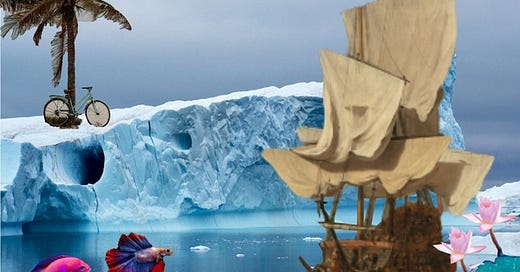ecophilia - Scaling vs. Fractals
Jessica Böhme
I am still recovering from covid, so today’s newsletter will be a bit shorter than usual.
Scaling vs. Fractals

I haven’t talked much about fractals yet and many people that I talk to about the project of fasting, fungi & fractals don’t understand what I mean by fractals and why it matters. As I described before, “a fractal is a never-ending pattern. They are infinitely complex patterns that are self-similar across different scales. To transition towards the Ecocene, understanding how our individual patterns relate to the whole to take adequate action and responsibility is a key driver”.
One of the key insights I gained about fractals is their contrast to scaling.
One question that has always concerned me by working in the sustainability field is the question of scale. Scaling is the concept that you take an idea, product, or service, and this one seed spreads without having to put equally extra work in. Ideally, it spreads globally. My search has always been for an idea that can scale massively as the problems seem too big to be tackled by small individual actions. I was also influenced by the startup culture in which the question of scale is the only question that matters. Does it scale? If it does. Jackpot. As the co-founder of Paypal, Peter Thiel said,
“A good startup should have the potential for great scale built into its first design.”
Yet, I also began to find that scaling has a weird aftertaste, like the taste of old oil in French fries. Although I came across many ideas that I found worth scaling, I also wondered: Who am I to know? Or who is anyone to know, for that matter, what should scale and what shouldn’t? For example, how do I know the best approach to degrowth in Santiago de Chile? How can my approach to regenerative living be practical in Paris?
I understood that scaling is very similar to colonization or proselytization. It’s the idea of taking one seed and spreading it throughout the world. It’s literally what Monsanto is doing. It’s what any successful global player has been doing. And until recently, it was what I thought I wanted to be doing.
But scaling decreases diversity. And as the example of Monsanto shows, all sorts of problems come from a loss of diversity. I am confident that people at Monsanto are not lying when they say they want to feed everyone on the planet and believe their solutions are the solution. But crops thrive in diversity, as regenerative agricultural practices show. Scaling food production does not seem to scale indefinitely.
Why fractals matter

Fractals - in contrast to scaling - are self-repeating patterns. In fact, fractals are scale-free. A tree, for example, is made up of branches, off of which are smaller branches, off of which are smaller branches, and so on. Fractals thus look similar, regardless of the scale at which they are viewed.
Instead of one idea, product, or service that spreads, instead of one seed, there are multiple seeds that follow similar patterns but are distinct by their context, environment and specifics. Each fractal has its context. To me, this is what glocal signifies—applying local solutions that are oriented towards global solutions. Fractals, not scales, are what we need for the Ecocene.
So instead of asking how the seeds we want to sow in the world scale, the more helpful question is to ask what patterns we want to see repeat in the world, such as kindness, generosity, or cooperation. If we change a pattern, for example, from exploitation to reciprocity, these patterns can more easily be applied by other similar systems.
Warmly,
Jes
In order to unsubscribe, click here.
If you were forwarded this newsletter and you like it, you can subscribe here.
Created with Revue by Twitter.
Jessica Böhme, Weserstr. 48, 12045 Berlin


